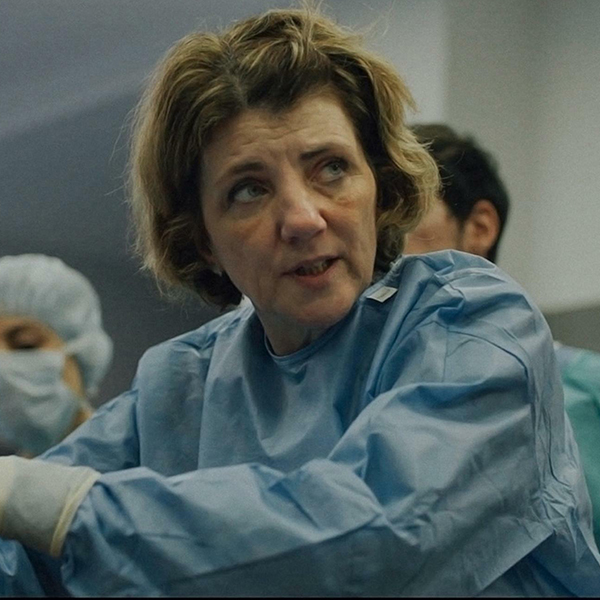It’s -12C on a wintry Montreal morning when a bumblebee floats past Lauren Rathmell, BSc’10.
“I think he just went from the zucchinis and now he’s headed to the cucumber – or she,” says Rathmell.
If the bee is a visual surprise in January, so is Lufa Farms, a green oasis perched discreetly atop a brick building not far from Montreal’s bustling Metropolitan Expressway.
Billed as the world’s first commercial rooftop greenhouse, the sprawling 32,000-square foot space is awash in green – with rows of vegetables and herbs, everything from cilantro and chives to cucumbers, peppers, radishes and arugula.
The idea was to create a new food system based on local and sustainable agriculture, says Rathmell, part of the founding team that includes her husband, Mohamed Hage, Lufa’s CEO.
“The fact that [interested customers] exist, that they want to buy what we’re selling, and to kind of be part of that mission is really exciting.
“And it’s not slowing down. That’s what has been kind of great and surprising in a lot of ways.”
In their first summer in 2011, Lufa Farms delivered a few hundred baskets every week to customers it dubs “Lufavores”. Today, it drops off more than 10,000 baskets a week in Montreal and beyond.
The company opened a second rooftop greenhouse in suburban Laval in 2013, and a third last year in Montreal’s east end Anjou borough, which Prime Minister Justin Trudeau, BA’94, visited last March.
“Lufavores are proud to be Lufavores,” says Rathmell.“They know what they’re a part of and that’s so key.”
Lufa Farms uses hydroponic cultivation methods, captures rainwater from the roof and recirculates all of its irrigation water. It also saves on energy, mainly through its location on a roof, and doesn’t use synthetic pesticides, herbicides or fungicides.
Hage and Rathmell started pondering the business venture during her last year at McGill where she studied biochemistry. After she graduated, Rathmell worked on a project in the research greenhouse at McGill’s Macdonald Campus.
“That’s kind of what laid the groundwork and ushered in the building of our first greenhouse,” says Rathmell, a Vermont native.
With no background in plant science, she credits associate professors Danielle Donnelly, in the Department of Plant Science, and Stan Kubow, BSc’78, at the School of Human Nutrition, with helping her acquire the foundational knowledge to start the company.
She and Hage also created a hydroponic set-up in their former downtown apartment, growing tomato, arugula and “really leggy” cucumber that extended into their living room.
“It’s surprising no one came knocking because it was street-facing with this huge orange light all night,” Rathmell laughs.
The initial greenhouse launched with private funding from the founding team, friends and family. They had little access to additional funding then. “It’s a weird definition ‘commercial-scale urban agriculture’ — nobody knew what to do with that.”
They also faced a learning curve, initially thinking they would be spared from pests in their urban rooftop setting.
“The first summer we had aphids everywhere,” recalls Rathmell, the company’s greenhouse and marketing director.
Instead of synthetic pesticides, Lufa Farms uses biological controls such as ladybugs to keep aphids in check. Tiny parasitic wasps are a powerful weapon against whiteflies, which twice wreaked havoc with their tomato crop.
As for the bumblebees, they pollinate flowers in the greenhouse, notably zucchini plants.
A computer program runs the show, “everything from the [energy] curtains that are creaking open at the moment to when the lights turn on and off to when the plants get watered,” says Rathmell, a self-confessed big data nerd.
The Laval facility specializes in tomatoes and eggplants, Ahuntsic focuses on cucumber and pepper, while Anjou, the largest greenhouse at 63,000-square feet, grows lettuce and greens.
Lufa Farms also offers seasonal produce from hundreds of partners who subscribe to organic or sustainable production methods. In addition to vegetables and fruit, their online marketplace includes bread from Montreal bakeries, dairy, meat and cheese.
Asked if there was a moment early on when they realized the business was taking off, Rathmell mentions their decision in 2013 to let customers select what they wanted in their baskets. “People got tired of getting cabbage and eggplant every week,” she says.
The warehouse below the Ahunstic greenhouse hums with activity on this morning with baskets ready for delivery. Customers collect them at hundreds of different pick-up points. Lufa Farms also offers home delivery via its electric cars for a $5 fee.
Tomatoes are its most popular item and the varieties are taste-centric, Rathmell says. “They’re literally picked as ripe as they can be, the day that you’re going to be eating [them].”
Lufa Farms has experienced incredible growth in Montreal, especially in the last two years, Rathmell says. They’re looking at building a fourth greenhouse in Montreal in the next two years, and another in a yet-to-be determined location in the northeast.
“We want it to change the world, not just the city.”


